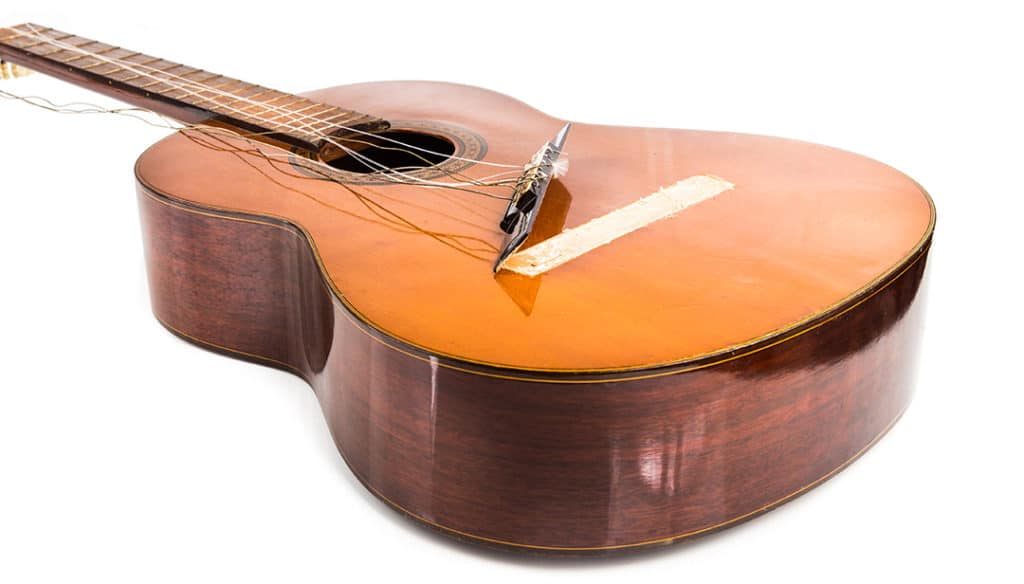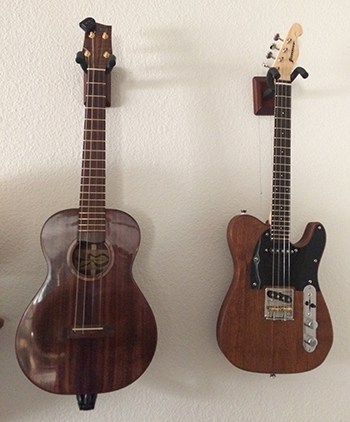Baritone ukuleles have such a satisfying guitar-like sound, I wondered if they would sound even better with steel strings. So I did some research and spoke with a custom ukulele builder to find out.
Putting steel strings on an instrument made for nylon is likely to result in poor sound at best and total destruction of your instrument at worst! You might snap the bridge right off of the sound board, warp the neck, or cause other structural failure.
Maybe you’re willing to take the risk though. What would it sound like? Pitch problems, poor action, and buzzing are just a few of the issues that occur.
Why? It has to do with the design and construction of the instrument.

Instruments Are Designed for a Specific String Type
The type of string to be used is part of the instrument’s design. From the bracing inside the body to the size of the slots and/or holes for the strings to the joining of the neck and the gluing of the bridge—all these choices in the build are made with the type of string in mind.
An instrument is designed for a certain level of pounds-per-inch of pressure or tension that is created when it is strung. The tension of steel strings can be more than double that of nylon. That’s why structural failure is a real risk.
An instrument is also designed for certain diameters of string to fit in the nut slots or bridge holes. Steel strings have a smaller diameter than nylon. (Higher tension and smaller diameter also make steel strings hurt more while you are developing your calluses.) So you can imagine the sound problems that would occur, such as buzzing and rattling.
You’ll also notice, if you compare steel string instruments to nylon string instruments, that the nut and saddle on a nylon string instrument are approximately parallel, where as on a steel string instrument, either the saddle is placed at angle, or the tuning pegs are placed diagonally on the head stock (Fender style, for example). That’s why intonation (pitch) will be poor if using the wrong type of string. The scale length of the strings are not exactly the same.
So the short answer is, if you like your instrument and want it to live long and resonate, while sounding great, stick with the type of strings it’s designed for. But by all means, experiment with different string sets in your category.
But Can You Just Try It?
You could, and people do—though certainly not on an expensive instrument! It’s possible to get really technical and calculate the amount of tension your instrument currently supports with nylon strings, and work from there, but you’ll likely to run into problems with intonation (pitch) and action (height of strings above the fretboard) because the instrument just wasn’t designed for steel.
Still, if you tend toward the mad scientist personality type, you can find string tension calculators on the internet. You’d have to guess how much additional string tension your instrument could tolerate, and select steel strings based on the calculations. However, the risk of structural failure is high and the sound will be poor.
But I Know a Guy Who Uses Steel Strings on His Uke
When you see steel strings used successfully on acoustic ukuleles, most certainly the instrument was designed that way. Steel string acoustic ukes exist out there in the ukulele community. And they can sound and work great—because the design and build was made for it.
The luthier I consulted confirmed what I learned from my research. He has designed and built acoustic ukes for steel strings that he and his customers were quite delighted with. But steel strings on a uke designed for nylon would cause a mix of structural problems that would give poor results and quite likely ruin the instrument.
Keep in mind that guitars that are made for steel strings will usually have a truss rod built into the neck to help it withstand the tension that is put on the neck by steel strings. Some nylon string instruments including some of the better ukes are made with truss rods. But the presence of a truss rod does not mean that you can use steel strings.
Related Posts
Choosing Strings for Baritone Ukulele
Solid-Body Electric Instruments Are Designed for Steel Strings
I recently got a Fanner electric baritone ukulele (on Etsy, from South Africa) which of course has steel strings. I played one at a ukulele festival and fell in love! Solid-body instruments have a completely different structural profile and are designed for steel. A solid body doesn’t have the resonating chamber of hollow body, so amplification and steel strings are needed.

Two baritone ukes: the Kimo custom baritone acoustic on the left is built for nylon or fluorocarbon strings. The Fanner Pixelator solid-body electric baritone on the right is built for steel.
On the Kimo, compare the arrangement of the holes on the pull-through bridge to the arrangement of the tuning pegs. The middle strings are set lower on the bridge to offset the higher arrangement of the tuners on the head stock. The scale lengths from string to string are much closer to each other on the acoustic instrument.
If you were to look inside the Kimo body, you’d see bracing that is designed for the tension of filament strings.
You would not have success interchanging the strings on these two instrument types.

Notice the Fender-style head stock on the Fanner and the diagonal arrangement of the tuning pegs. The scale length of the strings varies quite a bit.
Related Questions
Can I Put Classical Guitar Strings on a Uke? Classical guitars are made for nylon strings so, yes, you can classical guitar strings on your baritone ukulele if they are nylon, fluorocarbon, or gut. Try the middle four strings of a classical guitar set. (Because the bari scale length is shorter, a thicker string is needed to create the same note.)
What About Wound Strings? Wound strings are often used in baritone ukulele string sets. They are not the same as steel strings. A super thin metal wire, usually copper or silver plate, is wound around a nylon core. Some people love wound strings for the rich low notes they provide. Some people hate the squeak that can occur when your fingers slide across wound strings. You can try both to see what you like.
What Are the Best Strings for Baritone Ukulele? Strings are the subject of endless debate both friendly and contentious on the various forums where string players meet. Some people love strings that I hate and vice versa. So the answer for you is experimentation. Don’t be afraid to change strings and try different things. Do keep a notebook just for your string experiments so you can get back to that set you liked so much before you tried the new ones. But please don’t try steel strings unless you don’t care if your instrument literally explodes!
To read more about string choice, check on my post on the topic.
Conclusion
To sum up, don’t try steel strings on an acoustic instrument that you want to keep in good condition! If you’re not happy with the way your uke sounds, try different strings in the nylon/fluorocarbon category. If you’re looking for that guitar-like sound that you can get with baritone ukulele, try a string set with wound G and D strings.
If you decide to try it on a cheaper instrument because you’re a mad scientist and you just have to experiment, then learn how to calculate tension with different gauges (diameters) and work out the numbers to estimate what your uke can handle. And wear safety goggles so that when the bridge flies off and the steel strings whiplash, you’ll only get a cut on your cheek and not lose an eye! (Disclaimer: Don’t blame me if this happens!)
For me, I’ll stick with the nylon-fluorocarbon category.
That said, the best thing you can do for your uke is change strings. Try different sets. You’ll feel like you have a different uke each time. Just don’t use steel!



0 Comments